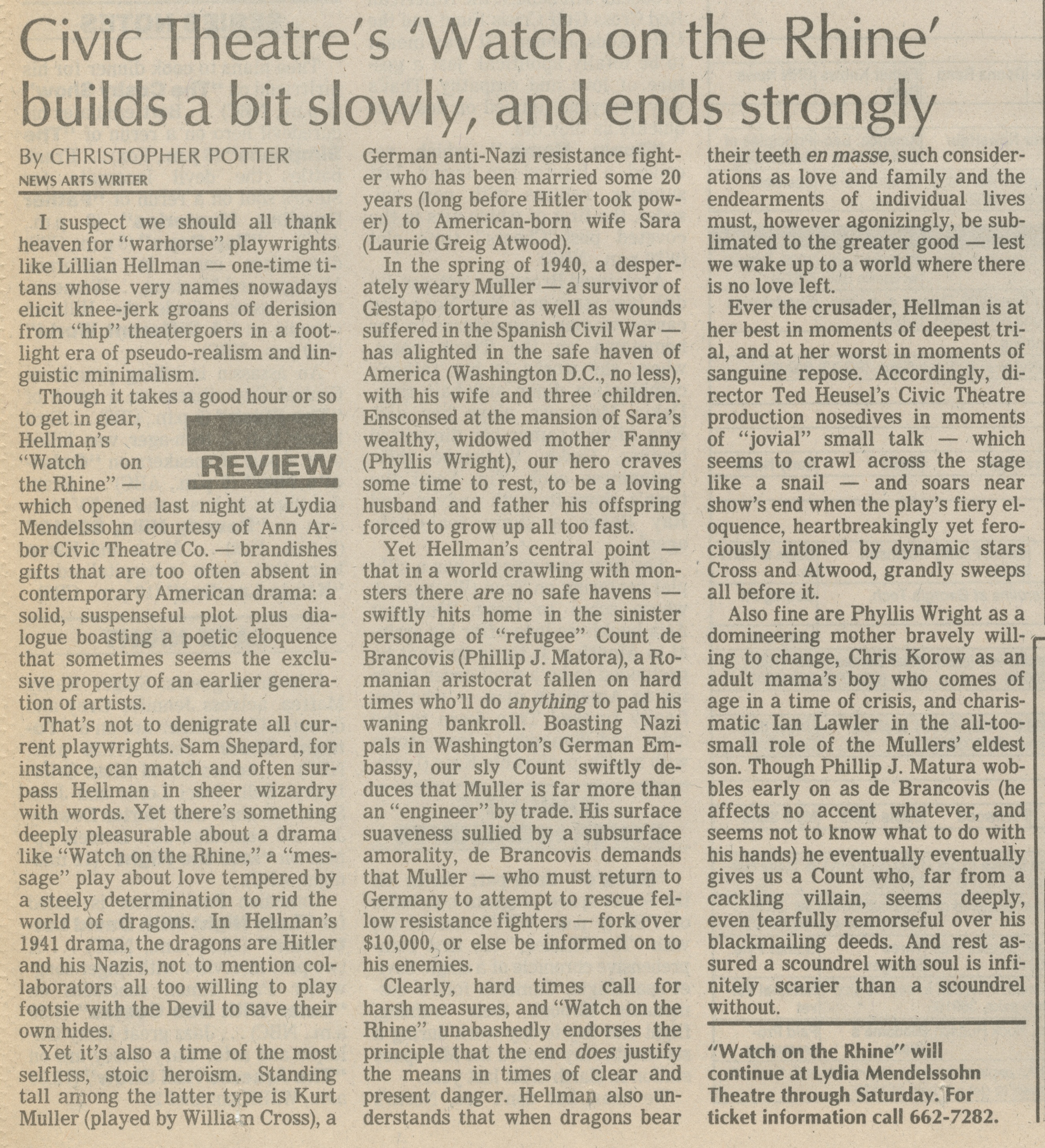Civic Theatre's 'Watch On The Rhine' Builds A Bit Slowly, And Ends Strongly

Civic Theatre's 'Watch on the Rhine' builds a bit slowly, and ends strongly
By CHRISTOPHER POTTER
NEWS ARTS WRITER
I suspect we should all thank heaven for “warhorse” playwrights like Lillian Hellman — one-time titans whose very names nowadays elicit knee-jerk groans of derision from “hip” theatergoers in a foot-light era of pseudo-realism and linguistic minimalism.
Though it takes a good hour or so to get in gear, Hellman’s “Watch on the Rhine — which opened last night at Lydia Mendelssohn courtesy of Ann Arbor Civic Theatre Co. — brandishes gifts that are too often absent in contemporary American drama: a solid, suspenseful plot plus dialogue boasting a poetic eloquence that sometimes seems the exclusive property of an earlier generation of artists.
That’s not to denigrate all current playwrights. Sam Shepard, for instance, can match and often surpass Hellman in sheer wizardry with words. Yet there’s something deeply pleasurable about a drama like “Watch on the Rhine,” a “message” play about love tempered by a steely determination to rid the world of dragons. In Hellman’s 1941 drama, the dragons are Hitler and his Nazis, not to mention collaborators all too willing to play footsie with the Devil to save their own hides.
Yet it’s also a time of the most selfless, stoic heroism. Standing tall among the latter type is Kurt Muller (played by William Cross), a
German anti-Nazi resistance fighter who has been married some 20 years (long before Hitler took power) to American-born wife Sara (Laurie Greig Atwood).
In the spring of 1940, a desperately weary Muller — a survivor of Gestapo torture as well as wounds suffered in the Spanish Civil War — has alighted in the safe haven of America (Washington D.C., no less), with his wife and three children. Ensconsed at the mansion of Sara’s wealthy, widowed mother Fanny (Phyllis Wright), our hero craves some time to rest, to be a loving husband and father his offspring forced to grow up all too fast.
Yet Hellman’s central point — that in a world crawling with monsters there are no safe havens — swiftly hits home in the sinister personage of “refugee” Count de Brancovis (Phillip J. Matora), a Romanian aristocrat fallen on hard times who’ll do anything to pad his waning bankroll. Boasting Nazi pals in Washington’s German Embassy, our sly Count swiftly deduces that Muller is far more than an “engineer” by trade. His surface suaveness sullied by a subsurface amorality, de Brancovis demands that Muller — who must return to Germany to attempt to rescue fellow resistance fighters — fork over $10,000, or else be informed on to his enemies.
Clearly, hard times call for harsh measures, and “Watch on the Rhine” unabashedly endorses the principle that the end does justify the means in times of clear and present danger. Hellman also understands that when dragons bear their teeth en masse, such considerations as love and family and the endearments of individual lives must, however agonizingly, be sublimated to the greater good — lest we wake up to a world where there is no love left.
Ever the crusader, Hellman is at her best in moments of deepest trial, and at her worst in moments of sanguine repose. Accordingly, director Ted Heusel’s Civic Theatre production nosedives in moments of “jovial” small talk — which seems to crawl across the stage like a snail — and soars near show’s end when the play’s fiery eloquence, heartbreakingly yet ferociously intoned by dynamic stars Cross and Atwood, grandly sweeps all before it.
Also fine are Phyllis Wright as a domineering mother bravely willing to change, Chris Korow as an adult mama’s boy who comes of age in a time of crisis, and charismatic Ian Lawler in the all-too-small role of the Mullers’ eldest son. Though Phillip J. Matura wobbles early on as de Brancovis (he affects no accent whatever, and seems not to know what to do with his hands) he eventually eventually gives us a Count who, far from a cackling villain, seems deeply, even tearfully remorseful over his blackmailing deeds. And rest assured a scoundrel with soul is infinitely scarier than a scoundrel without.
“Watch on the Rhine" will continue at Lydia Mendelssohn Theatre through Saturday. For ticket information call 662-7282.
REVIEW